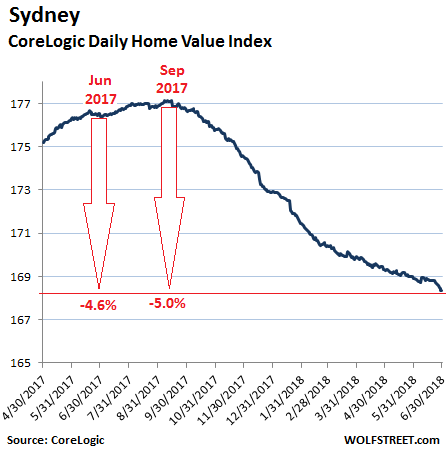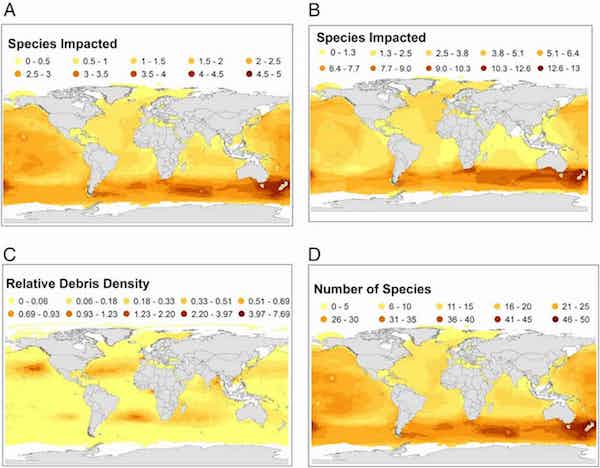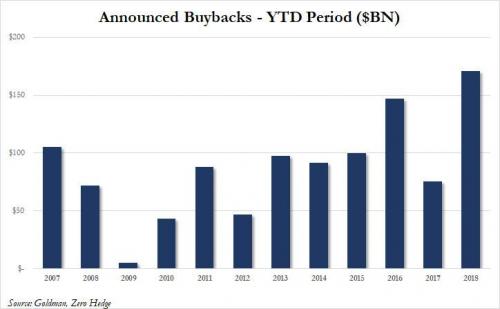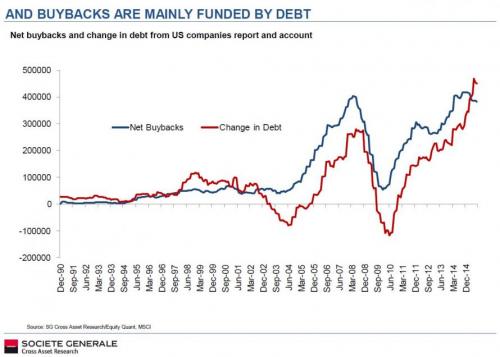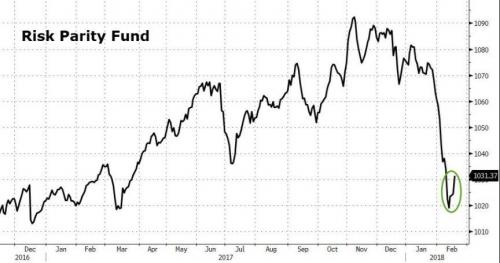
Henri Matisse Reading woman in violet dress 1898

Act like grown-ups.
• China Imposes Tariffs, Says US Launching ‘Largest Trade War In History’ (CNBC)
China implemented retaliatory tariffs on some imports from the U.S. Friday, state media reported, immediately after new U.S. duties had taken effect. The move signals the start of a full-blown trade war between the world’s two largest economies, after President Donald Trump’s administration had initially made good on threats to impose steep tariffs on Chinese goods. At midnight Washington time, the U.S. imposed new tariffs on $34 billion of annual imports from China. This prompted Beijing to respond in kind with levy tariffs on 545 items of U.S. imports — also worth $34 billion, state-run newspaper The China Daily reported Friday.
A spokesperson at China’s ministry of commerce said that while the Asian giant had refused to “fire the first shot,” it was being forced to respond after the U.S. had “launched the largest trade war in economic history.” “This act is typical trade bullying,” the spokesperson said, before adding: “It seriously jeopardizes the global industrial chain … Hinders the pace of global economic recovery, triggers global market turmoil and will affect more innocent multinational companies, general companies and consumers.”

China has already retaliated.
• Trump Says China Could Face More Than $500 Billion In US Tariffs (CNBC)
President Donald Trump said on Thursday he would consider imposing additional tariffs on $500 billion in Chinese goods, should Beijing retaliate. U.S. tariffs on $34 billion worth of Chinese goods kicked in on Friday. Another $16 billion are expected to go into effect in two weeks and potentially another $500 billion, Trump told reports aboard Air Force One on his way to a rally in Montana before the tariffs kicked in. China implemented retaliatory tariffs on some imports from the U.S., state media reported about two hours later, after new U.S. duties had taken effect.
First “34, and then you have another 16 in two weeks and then as you know we have 200 billion in abeyance and then after the 200 billion we have 300 billion in abeyance. Ok? So we have 50 plus 200 plus almost 300,” Trump said. “It’s only on China,” he added. Trump’s statements reinforce earlier threats that he would escalate the trade conflict. The dispute with China has roiled financial markets worldwide, including stocks, currencies and the global trade of commodities from soybeans to coal.

Was that so hard?
• Merkel Open To Reducing EU Tariffs On American Cars (NC5)
In the midst of trade tension between the European Union and the U.S., German Chancellor Angela Merkel said she’s open to lowering tariffs on American car imports. According to Reuters, Merkel said Europe would have to first agree upon a reduction in tariffs. In addition, she cited World Trade Organization rules that state lowering U.S. auto tariffs would mean doing the same for other countries as well. Merkel’s comments come after President Donald Trump imposed steel and aluminum tariffs on U.S. allies, including the EU, and threatened to put a 20 percent tax on European car imports.
The German chancellor warned Trump on Wednesday not to implement auto tariffs to avoid inciting an all-out trade war. Auto industry experts have suggested that if the Trump administration follows through on that threat, the move would negatively affect American autoworkers’ jobs and raise car prices. Trump is scheduled to travel to Brussels next week for the NATO summit, his first big meeting with European leaders together since last month’s G-7 summit.

With 95 million still out of the labor force.
• US Labor Shortage Is Reaching A Critical Point (CNBC)
America’s labor shortage is approaching epidemic proportions, and it could be employers who end up paying. A report Thursday from ADP and Moody’s Analytics cast an even brighter light on what is becoming one of the most important economic stories of 2018: the difficulty employers are having in finding qualified employees to fill a record 6.7 million job openings. Truck drivers are in perilously low supply, Silicon Valley continues to struggle to fill vacancies, and employers across the grid are coping with a skills mismatch as the economy edges ever closer to full employment. “Business’ number one problem is finding qualified workers. At the current pace of job growth, if sustained, this problem is set to get much worse,” Mark Zandi, chief economist at Moody’s Analytics, said in a statement.
“These labor shortages will only intensify across all industries and company sizes.” Private payrolls grew by 177,000 in June, a respectable number but below market expectations. It was the fourth month in a row that the ADP/Moody’s count fell short of 200,000 after four months at or above that level. The reason for the tick down in hiring certainly isn’t because there aren’t enough jobs. The Bureau of Labor Statistics reported that April closed with 6.7 million job openings. May ended with just over 6 million people the BLS classifies as unemployed, continuing a trend this year that has seen openings eclipse the labor pool for the first time. At some point that gap will have to close. Economists expect that employers are going to have to start doing more to entice workers, likely through pay raises, training and other incentives.

“We have been telling the UK for two years that we would not accept a single market a la carte. “What do they come with? – A single market a la carte.”
• Theresa May’s New Customs Plan ‘Dead On Arrival’ In EU (Ind.)
Theresa May’s new plan for future relations with the EU will be “dead on arrival”, senior figures in Brussels have told The Independent. EU officials said any hint that the UK wants to be part of the single market on goods, but not services will be rejected. It is a blow for the prime minister who has spent the last week in meetings with EU leaders, including Angela Merkel, in a bid to prevent Europe dismissing her plans out of hand when they are published next week. Ms May is expected to push her cabinet to agree to a plan at Chequers on Friday, which would see Britain remaining in full regulatory alignment with the EU on goods, but not on services.
The meeting has also been preceded by threats and warnings from the Brexiteer wing of the Conservatives that the proposals mooted by the prime minister will not be accepted by them in the UK because they keep Britain too closely tied to the EU’s rules and regulations. But before her ministers have even agreed to the deal, EU officials told The Independent the white paper would be “dead on arrival” in Brussels if, as expected, it proposes that the UK remain in the EU’s single market for goods, but not services. They claimed they had repeatedly warned UK negotiators that this option would not work. They said it had been widely discussed among EU ministers and rejected – including, crucially, by the EU’s two most powerful players, France and Germany.
One Brussels source said: “We have been telling the UK for two years that we would not accept a single market a la carte. “What do they come with? – A single market a la carte.”

Who will be left standing by Saturday?
• Theresa May Battles To See Off Revolt Ahead Of Key Brexit Summit (G.)
Theresa May was battling to see off a revolt on the eve of a critical cabinet summit, as Boris Johnson convened a meeting of pro-Brexit ministers to discuss their options amid an atmosphere of tension and recrimination. The government was forced to deny “selective leaks” that appeared to suggest that the UK could struggle to strike a trade deal with the US in the future. No 10 insisted that paperwork released to ministers ahead of Friday’s crunch Brexit meeting at Chequers said just the opposite – as a caucus of seven cabinet members including Johnson, Michael Gove, Liam Fox and David Davis met at the Foreign Office to discuss their concerns.
An early leak suggested that the UK should “maintain a common rulebook” with the European Union on food and farming standards and that could make striking a trade deal with the more free market-oriented US more difficult as a result. That prompted a series of complaints from backbench Tory MPs and led to the Thursday evening meeting at the Foreign Office hosted by Johnson, the foreign secretary. Sources at No 10 said there had been selective leaks from the paperwork and the controversial passage appeared on page 15 out of 50 from one of several documents sent to all members of the cabinet.
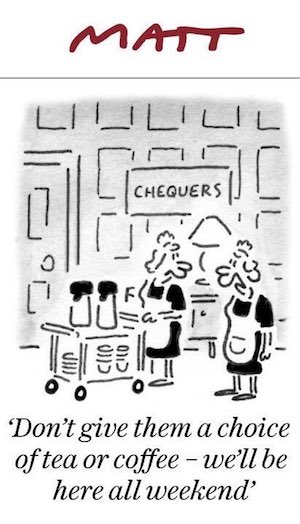

It’s corporations this time around.
• The Dark Cloud Of Global Debt (GT)
While everyone is debating the effects of possible trade sanctions on the global economy, few are paying attention to a far more serious issue. Enormous global debt, combined with low-interest rates, have set the stage for a global recession that has the potential for economic chaos. The combination of enormous debt and artificially low-interest rates were at the center of the 2008 credit bubble. One would expect central banks to be aware of this and show more concern. However, the overall silence has been astonishing. An exception to this is the Bank for International Settlements (BIS), which has been making loud noises about the toxic level of global debt and the anticipated bubble.
It recently reported that the global debt of 2008 was $60 trillion, small when compared to the current debt of $170 trillion. To make matters worse, today’s global debt is 40 percent higher in relation to GDP than it was in 2008, just prior to the Lehman Bros. downfall. To add to the current headache are the rising debt levels of emerging markets and corporate debts. According to McKinsey & Company, a global consulting firm, two-thirds of U.S. corporate debt are from corporations that pose a high default risk. Countries such as Brazil, India, and China have been busy issuing questionable credit. This dubious credit being issued in many emerging markets has come with extremely low-interest rates.
If the borrowers’ default, the lenders won’t be looking at enough compensation to recoup their loses. Low-interest rates have become an overall global problem, including the rates in the U.S. high-yield bond market. Central banks around the world have been keeping interest rates artificially low while printing money with abandon. The current global debt is the direct result of this policy. $2 trillion in corporate debt will be maturing annually through 2022. A considerable amount of this debt may default and cause debt repricing. The damage caused by central banks and their policy of easy credit has been done, and there is little that can be done at this point to stem the tide. It can only be hoped that they are more aware now than they were in 2008.

Central banks don’t really matter anymore.
• “People Assume That Stocks Always Rise Over Time. They’re Wrong” (Eric Peters)
We’ve all looked at the stats, and we’re now at an unemployment rate in the US of sub-4% – 3.8%–3.7%. I think what a lot of people focus on is if the participation rate were back where it was pre-2008 you’d end up with an unemployment rate that had an 8 handle or something like that. So that’s what people are referring to. But making comparisons like that is difficult because a lot of things are changing. The US labor force is shrinking because people are getting older. There is the opioid issue. And this disability issue. Which are difficult to really handicap in terms of how big an impact that’s having on the US labor force.
If the central banks have been the ones who have gotten us here, they just – by definition – they’re not the ones that are going to get us out of here. So I think – look, we’re always going to look at what central banks are doing, they will be important. But I think that they’re no longer going to be dominant. What’s going to be dominant are the politicians. You’re seeing that in the US right now. I know that everyone loves to hang on every word that Powell speaks. And they look at the Fed statement. And people are still trained to look at the Fed dot plots (which are probably going to go away). People are trained to look at all of these things because that’s what they’ve done their whole careers.
But they just are not going to matter that much anymore. Whether the Fed’s terminal rate is 2.25 or 2.5 or 2.75 – we’re not talking about much. What are we going to do in terms of immigration policy? What are we going to do in terms of trade policy? How is that going to impact all of the major corporations’ global supply chains? These are the things that are really going to matter.

“It is a confluence of events coming in October ..”
• Most Dangerous Market Ever – Michael Pento (USAW)
Money manager Michael Pento is sounding the alarm because we are getting very close to something called a “yield curve inversion.” Pento explains, “Why do I care if the yield curve inverts? Because 9 out of the last 10 times the yield curve inverted, we had a recession. . . . The spread with the yield curve is the narrowest it has been since outside of the start of the Great Recession that commenced in December of 2007. . . . The last two times the yield curve inverted, we had a stock market drop of 50%. The market dropped, and the S&P 500 lost 50% of its value.” Can we keep partying in the markets like it’s 1999 or is there an expiration date for the good times?
Pento says, “Well, I have put a check on the calendar for October because of the fact the rate of quantitative easing goes to $15 billion per year, because the trade war will reach a crescendo, then because I believe, unfortunately because I am conservative, the Republicans lose the House of Representatives, because the Chinese credit boom will be in full reverse by October. It is a confluence of events coming in October . . . we’ve already entered into the beginnings of a bear market around the world. The top 22 banks in the world are in a bear market. There are many, many examples of banks around the world that are in a bear market. You have a bear market in Chinese shares. 20% of the S&P 500 is in a bear market. This is an incipient bear market that is already beginning. I believe it manifests clearly to even the people on CNBC by October.”

None of this makes any sense.
• Moscow Using UK As Dumping Ground For Poison, Says Sajid Javid (G.)
Britain will consult its allies about a possible response to Russia over the latest poisonings in Wiltshire as it emerged that the couple taken critically ill had handled an item contaminated with the nerve agent novichok. The home secretary, Sajid Javid, accused Moscow of using the UK as a “dumping ground” for poison and urged Russia to explain “exactly what has gone on”. In Salisbury, public health and council chiefs warned people not to pick up unidentified objects but dismissed the idea of making a general sweep of the city for novichok, although they said they could not rule out the possibility that more of the nerve agent was present.
The Guardian understands that the novichok that harmed them may have been in a sealed container left following the attack on the former Russian spy Sergei Skripal and his daughter, Yulia, in March. Sources close to the investigation dropped a hint that they may now know the identity of the would-be killers who targeted the Skripals. The Metropolitan police confirmed on Thursday evening that the couple taken ill, Dawn Sturgess, 44, from Salisbury, and Charlie Rowley, 45, of Amesbury, collapsed after picking up a contaminated item.

Even the Guardian allows itself to publish out right criticism. Putin has a really successful World Cup going. Brexit splits Britain. 1+1=2
• If The Novichok Was Planted By Russia, Where’s The Evidence? (G.)
I seem to be the only person alive with no clue as to who has poisoned four people in Wiltshire. I am told that only Russians have access to the poison, known as novichok – though the British research station of Porton Down, located ominously nearby, clearly knows a lot about it. Otherwise, I repeat, I have no clue. I suppose I can see why the Kremlin might want to kill an ex-spy such as Sergei Skripal and his daughter, so as to deter others from defecting. But why wait so long after he has fled, and why during the build-up to so highly politicised an event as a World Cup in Russia? Four months on from the crime, the Skripals have been incommunicado in a “secure location”. Barely a word has been heard from them.
Theresa May has persistently blamed Russia. She has called the incident “brazen and despicable”, and MI5 condemned “flagrant breaches of international rules”. But I cannot see the diplomatic or other purchase in prejudging the case, when no one can offer a clue. As to why the same person or persons should want to kill a couple, unconnected to the Skripals, on an Amesbury housing development, the questions are even more baffling. It seems a funny sort of carelessness. Did the couple pick up the infecting agent nearer the original site, eight miles away? Might the new poisoning be an attempt to divert attention from the earlier one? Could it be a devious plot, to make it seem that novichok is available on every street corner, from your friendly neighbourhood drug dealer?
Or perhaps one of the victims, Charlie Rowley, has mates in Porton Down? Perhaps someone is showing off, or panicking, or behaving like a complete idiot. Who knows? Since I have not a smidgen of an answer to any of these questions, I feel no need to capitulate to the politics of terror and fear. I can open my front door without cleaning my hand. I can visit Wiltshire in peace and safety and marvel at the spire of Salisbury Cathedral. I can revel in the remains of the bronze age Amesbury archer – whose death from bone disease has finally been resolved by the scientists. Where knowledge is nonexistent, ignorance is bliss.

NIMBY on steroids.
• Seehofer Tells Merkel, Italy And Greece To Solve Migration Row (EUO)
German interior minister Horst Seehofer defused tensions with Austria on Thursday (5 July) but increased political pressure on his boss, chancellor Angela Merkel, as well as on Italy and Greece, to find a way how Germany can reject asylum seekers without closing its border with Austria. “There will be no measures taken by Germany at the expense of Austria,” Austrian chancellor Sebastian Kurz said after meeting Seehofer in Vienna. Under a plan agreed on Monday between Merkel’s centre-right CDU party and Seehofer’s CSU, its Bavarian conservative sister party, asylum seekers would be sent back to the EU country where they were first registered, or to Austria.
Kurz had warned that in reaction, Austria would consider closing its own border with Italy and Slovenia in order to prevent migrants from coming in. This, Vienna had warned, would lead to a “domino effect” of closing borders and imperil the free-movement Schengen area. But Seehofer assured Kurz that Austria would have to take no specific measures, and that it would be up to Italy and Greece, where three-quarters of asylum seekers come from, to take them back. The Bavarian politician has been trying for almost a month to impose his plan on Merkel, who first refused to unilaterally reject asylum seekers. She advocated instead a “European solution” to be agreed with other member states, who would accept taking refugees from Germany.

It’s not defeated yet.
• European Parliament Rejects Controversial Copyright Rules (Ind.)
The European Parliament has voted against an incredibly controversial new set of copyright rules that campaigners claim could “ban memes”. The law will now be sent for a full reconsideration and debate inside the parliament, during which activists will try and remove the controversial Article 11 and 13. Article 11 has been referred to by campaigners as instituting a “link tax”, by forcing tech companies like Google and Facebook to pay to use snippets of content on their own sites. Article 13 adds rules that make tech companies responsible for ensuring any copyrighted material is not spread over their platforms. Those rules could force technology companies to scan through everything their users post and check it doesn’t include copyrighted material.
If it is found, the post will be forced to be removed, which campaigners claim could destroy the kind of memes and remixes that spread across the internet. The revamp has triggered strong criticism from Wikipedia founder Jimmy Wales, World Wide Web inventor Tim Berners-Lee, net neutrality expert Tim Wu, internet pioneer Vint Cerf and others. Copyright campaigners claim that the rules are necessary to ensure that material isn’t illegally spread across the internet. Europe’s broadcasters, publishers and artists including Paul McCartney backed the rules, arguing the controversial Article 13 would protect the music industry.
A total of 318 law makers voted against opening talks with EU countries based on the committee’s proposal while 278 voted in favour, and 31 abstained. In practice, the vote only delays the final decision on the rules and gives the European Parliament more time to deliberate on them. Another decision will be taken in September.



